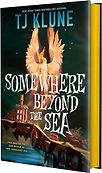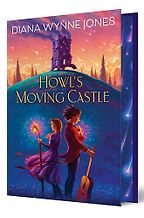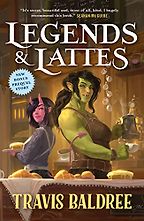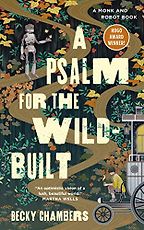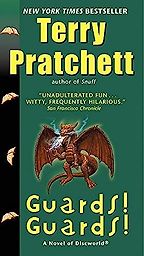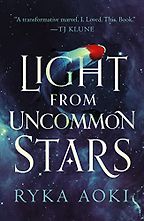When people think of fantasy they often think of epics like The Lord of the Rings, but there’s a whole other side to fantasy in the ‘cozy’ book genre. Could you tell us about that world?
Absolutely! So while I would not say, in any way, shape or form, that I created the cozy genre – we’ll be looking back here at writers like Diana Wynne Jones – I do think that my book The House in the Cerulean Sea and Travis Baldree’s Legends and Lattes ushered in this wave of what I consider low-stakes fantasy. It’s not about big battles and swords and lopping off heads – it’s pretty much the opposite of what we went through in the 2010s, which was grimdark fantasy, Game of Thrones, and all of that. It’s a very different side of fantasy. We can use these kinds of stories to talk about things like bigotry, othering people, governments and how they interact with people… It’s not about the chosen one and the end of the world. It’s about the world that we live in. How can we make it better? How can we help spread what’s good?
It’s perhaps no coincidence that this is popular right now.
Exactly! I love that we can have this genre. In the pandemic times it was cozy; now we’re looking at romantasy. Even though those things have always existed, they’re just getting new, funny little titles, and growing out into the public consciousness.
I think the reason the idea of cozy fantasy got so big was the pandemic. So many of us were stuck in our homes and didn’t know what was going on, how we were going to react and how long it was going to take. So I think that a lot of readers turned to books filled with hope and joy and togetherness, because that’s what we were missing at that time.
It was so noticeable to me looking at the 2023 Hugo nominees – including Legends and Lattes – that they were all personal stories. Only one was explicitly pandemic-based, but it did feel like they all reflected the mood of the time they were written.
Yes! And I love that we get to have that form, that side of fantasy. It doesn’t need to be about kings and queens, and all of that stuff. I love that we have seen fantasy expand beyond what traditional fantasy means into something that is accessible to so many more people.
Let’s turn to your first choice – by someone who wouldn’t have known the term ‘cozy fantasy’, but was certainly pioneering it. Please introduce us to Howl’s Moving Castle, by Diana Wynne Jones.
So most people probably have a relationship with Howl’s Moving Castle because of the Studio Ghibli movie, and that is absolutely 100% acceptable. I aspire to write how Studio Ghibli movies feel and look! Nobody in the world can animate food like Studio Ghibli, every little detail looks so intricate. It might be weird to say, but that’s how I want my books to feel: the way Studio Ghibli animated food looks.
But Howl’s Moving Castle the book is a really different thing from the film. In the film, Howl is this mysterious, moody guy, this wizard in his moving house. In the book, he’s kind of a dick. I love that about him – I love how there’s these two different sides of him. Then Sophie comes in, and is such a beautiful, fully-realized character. And then don’t even get me started on Calcifer!
I love both of those two – tell us a bit more about them!
Calcifer is the fire from the fireplace. When I wrote a book called In the Lives of Puppets, the family is made up of a Roomba vacuum with social anxiety and a medical nursing machine who’s a bit of a sociopath. I feel like I can give those kinds of side characters life because of what Diana Wynne Jones did with her side characters.
But Sophie is the protagonist, a girl who comes into the house. You root for her. You want her to break down Howl. Howl’s a bit of a fuckboy in the book. He is such a weasel. It reminds me a bit of the Disney movie Beauty and the Beast with the back and forth, only Howl is the cool kid who knows he’s cool—but probably isn’t as cool as he thinks he is. I love the push and pull between all of them.
Howl’s Moving Castle made such an impression on me when I read it for the first time, because I realised: This is what fantasy can be! This was in the 1980s and 1990s, when all the fantasy covers were big buff men holding swords, or wizards with lasers shooting out of their hands, and then you have Howl’s Moving Castle. It’s absolutely tremendous. It’s the first of a series, there’s multiple books, but this first one will always be my favourite. I read it as a kid, and I reread it once every couple of years. Nobody could write that kind of book like she did. Books like The Last Unicorn by Peter Beagle came out around the same time but, to me, Howl’s Moving Castle is the definitive idea of what cozy fantasy could be. Even if the wizard Howl in the book is such a jerk – I love him for it!
We’ve already touched on your next choice: Legends and Lattes, by Travis Baldree. It was nominated for the 2023 Hugo Best Novel, and won him the Hugo Astounding Award for Best New Writer. Would you tell us about it?
Legends and Lattes is about an orc. And after war, after fighting, after being what an orc is supposed to be, this orc decides one day that they don’t want to fight anymore. They want to open a coffee shop. Think about that – that’s what the book is about. It’s not about going on epic adventures, or fighting huge, tremendous evil. It’s literally about opening a coffee shop in a little city.
I’ve met Travis Baldree a few times, and we’ve been on panels together. It turns out that not only is Travis Baldree a tremendous author who can write amazing books; not only does he narrate his own audiobooks and does them well; he also worked on video games that I’ve played in the past. You know when you see people that are that good at everything, and you think: Gosh, that’s freaking rad. That is so cool. I would never be able to do half of what he does.
I never want to record an audio book with my voice on it, that’s crazy to me – I got to record the acknowledgements for my upcoming book, and even that felt weird. But to have him do the audio, to me, that shows just how deeply in love with his characters and his story he is, that he wants to be the one to give them life and a voice.
Legends and Lattes, it blew up. It was huge, and it spawned a prequel: Bookshops and Bonedust. Man, if you had told me ten years ago that we could have a book about an orc opening a coffee shop and finding queer love…
These are queer women, that’s what these books are about: queer love stories, and books, and the past and what the future could be, and how that could define you, and how it doesn’t always have to define you. All of these wonderful things come together in this perfect little package. It’s one of those ideas where you think: Of course, this makes sense. I wish I had thought of that.
I have my own version of a tea shop in a book – but this one, this is just perfect. I would not have thought to do something like that. It is absolutely delightful.
I wanted cinnamon rolls so badly the whole way through. I love a fantasy book that makes you more excited about some aspect of the real world, not less.
Yes! And it can also sometimes help explain the real world in certain ways. Maybe not a one to one analogue for what we are going through in the real world—but when you can talk about stuff like anxiety, like depression, like having a past that isn’t the best, but still having hope for the future and still learning and growing. That’s just tremendous. It’s so cool that we get to do stuff like that.
Legends and Lattes is also very funny – I spoke to Travis Baldree not so long ago about humorous fantasy novels. Are cozy fantasy books often funny?
I think that they can be. The problem is that humour is very subjective, so what’s funny to one person is not funny to another person. I’ve had people tell me that my sense of humour is exactly like theirs, and I’ve had people tell me that they don’t understand me in any way, shape or form. And that’s totally fine. But I think good humour writing is much, much harder than, say, writing a big battle scene. It has a cadence to it, a bounce, it has to be a call and response going back and forth. You have to work on those turns of phrase, the metaphors and similes and all those little things – because words can be twisted in such wonderful, delightful ways. That’s where humour can be unexpected. Douglas Adams, Terry Pratchett—their turns of phrase are extraordinary.
And we’ll come to Terry Pratchett on your list very soon. But, first, could you tell us about your third cozy fantasy book recommendation, A Psalm for the Wild-Built by Becky Chambers?
Oh my god, this book! So I talked a little bit about how in my book Under the Whispering Door, which is my version of the way-station to the afterlife, I have a tea shop. The owner of the tea shop, a man named Hugo, is also a ferryman, whose job it is to help people cross over to the next life, or at least help them prepare for what their next step is. And a big part of that was tea. Hugo makes tea for the ghosts who come through, and he gets a specific type of tea for each one. The reason I did that was because tea is one of the oldest drinks in the world. It is the second most consumed drink in the world, following water, and there are so many traditions when it comes to tea. Every civilization, every culture in the world, has some kind of ceremony when it comes to tea.
“It’s not about the chosen one and the end of the world; it’s about the world that we live in”
So in this book: imagine then the end of the world, and instead of a tea shop, you have a tea monk who basically goes around selling tea, hawking his wares. When he’s in the middle of his travels, he meets a robot. The book asks a fundamental question that I am absolutely in love with: What do people need? That is such an amazing question, because there’s not one right answer, everybody is so different – and yet, is there a right answer that could be universal? What is it that humanity needs? What does humanity need at the end of the world? What does it need when we’re all scattered and separated and apart? What does it mean when we have little pockets of survival around this broken world? They have beautiful, philosophical conversations about what it means to be human, and what a human being needs to survive.
This is a very short book, a novella. It has some sequels too. I have a hard time writing shorter works, because I love every single word ever written, so my books are usually very big. The fact that Becky Chambers was able to fit all of this into around 150 pages is mind-boggling. I’ll never be that good an author, ever. I love the book. A Psalm for the Wild-Built is just an extraordinary piece of fiction.
I did smile when I saw ‘What do people need?’ in the copy for this book – because it’s the question in Legends and Lattes, and in your own The House in the Cerulean Sea, just made more explicit.
Yes! It’s not necessarily about who people are. It’s not necessarily about what their hopes are for the future. It’s about, what do they need now? What do you need right now to be happy – to be content? And to have it come from a machine is even more remarkable – especially in the futuristic year of 2024, living through the advent of artificial intelligence, the idea of a robot being the one to ask what people need is wonderful. It makes me hope that we don’t have to live in a future that’s like The Terminator!
I’d love to know more about the origins of the idea for The House in the Cerulean Sea – and for readers who are unfamiliar, could you tell us about the story?
The House in the Cerulean Sea is about a caseworker for the Department In Charge of Magical Youth. He’s essentially a social worker. His name is Linus Baker, and he is the perfect bureaucrat: he does what he’s told, and he does it well. And because he is so paint on the wall dry, he is tasked by a shadowy government group to go to a very specific island. On this very specific island are six children who are some of the most dangerous magical children in the world. His job is to check: are they planning to destroy the world? He has all these preconceived notions and ideas about what these children are. And when he gets there, he finds that – surprise, surprise – they’re just children. Yes, one of them is the Antichrist. Yes, one of them is a boy-blob named Chauncey. Yes, one is a wyvern. Yes, there is a were-Pomeranian. Yes, there is a wonderful girl named Phee who is a sprite. Yes, there’s a garden gnome named Talia who threatens death on a regular basis… But when Linus gets there, he finds something he did not expect. He finds a home, and not only that, he finds hope and joy and love with this family – and with Arthur Parnassus, the headmaster. Over the course of the novel, he begins to realize that things are not what they seem, and that – like Arthur says in the book – it takes a few people coming together to change everything.
That was the genesis of the book. I’d wanted to write something about magical children and the idea of being othered, because so many people in the queer community have grown up being othered. They have grown up not being able to relate to their peers, and being told that they’re different. I know what that feels like. I was a queer kid growing up in the rural countryside in the 1980s and 1990s; you can imagine how a slightly effeminate queer kid with undiagnosed ADHD would do in a place like that. Not well.
When I wrote The House in the Cerulean Sea, I wanted to expand on a couple of ideas. There was the idea of nature versus nurture. If a child – say, a child like Lucy the Antichrist – is told that he’s going to be the most destructive thing the world has ever known, he’s going to bring about the end of days. But what happens if someone like that is given a chance to just be a kid? What happens if people who’ve been told they’re monsters all their lives get a chance to just be? I wanted the book to explore the power of trauma, but also the power of healing, and what that looks like. When I write these books, I have to know what I’m talking about. So for the first book and the sequel, I spent so much time talking to teachers, social workers, people who have been fostered or adopted, and people who fostered and adopted. I have to know what it feels like to be in those situations.
And there’s a sequel.
The sequel is called Somewhere Beyond the Sea. To be honest, I was not planning on writing a sequel. I wanted The House in the Cerulean Sea to be standalone – and that’s still going to be the case for Under the Whispering Door and In the Lives of Puppets; I’m never going to go back and write sequels to those. The reason I chose to write a sequel to The House in the Cerulean Sea is because of something that’s happening in the United States and in the UK. I won’t speak to the UK side of things because I am not from there, but in the United States, there’s a very big anti-trans movement that is going on. In 2021 and 2022, our government invited people to testify: trans people, and parents and guardians of trans youth, and medical professionals who provide gender affirming care. The purpose was supposed to be hearing people speaking their truths. And they were met by two types of politicians.
One, the politicians who said, ‘We see you, we hear you’ – and then turned around and voted against any pro-trans protections. Or two, the worst ones, the ones who sat there with smarmy condescending smiles and questioned literal children about their brains, about their bodies, about their right to exist. And that absolutely floored me, that this was allowed to happen. These are people who are supposed to represent you. I remembered at the end of The House in the Cerulean Sea where Arthur was invited to come and testify in front of the government, and I decided to use that as the jumping off point. What if, instead of being invited to testify, it was an ambush? What if something like that happened in the book?
I actually got to speak with some of the people who testified in front of the government. I asked them all one question: if you knew what was coming, would you do this all over again? Every single one of them unequivocally said yes. That’s why I wrote this book: for people in my community who have used their voice only to be met with vitriol from people who should know better – people in power. What happens when those people in power decide to say no to you; what they want to end everything you hold dear? What do we do then? That’s where the sequel comes in.
It’s so interesting to hear that you do such an intense research process – it’s maybe not what people associate with fantasy books.
It’s important to me. I am not a social worker, I don’t know anything about social work – so if I’m going to be writing about a man whose job is tantamount to social work, then I need to talk to people who actually do the job. And then I find out, of course, that like so many other people – like teachers and librarians – they are woefully underpaid, woefully overworked. I was able to speak to some social workers that I spoke to back in 2018 for the first book, and I asked them: Has it gotten any better? No. There’s a couple of people that I spoke to back in 2018 who are no longer social workers, because it was too hard for them to deal with. And I get that. To be a social worker, you have to be one of the kindest, most empathetic people in the world, while still being able to be tough when needed. That is a tremendous job to have to do.
It makes Linus wonderful protagonist, even though he’s an unusual personality to see in the hero role.
I love that. How many times do we get to see a fat, fussy, queer man in his forties as the main character, as hero of the book? I wanted to show that every shape and size you could come in, you can be a good person, you can be a hero.
Hm, I’m now seeing it’s a running theme of all these books – to have unusual protagonists. On that note, let’s talk about your fourth choice, Guards! Guards! by Terry Pratchett.
Guards! Guards! is part of the Discworld book series. Terry Pratchett is – or was, I have to say, unfortunately – he was one of the most dynamic and beautiful writers I have ever read. Earlier I talked about turn of phrase: nobody, absolutely nobody, can play with words like Terry Pratchett. There’s a couple of quotes that I want to read, then we can talk about the book. They’re both from Guards! Guards!
The food was good, solid stuff for a cold morning, all calories and fat and protein and maybe a vitamin crying softly because it was all alone.
I love that. It’s so funny. And the other one:
People who are rather more than six feet tall and nearly as broad across the shoulders often have uneventful journeys. People jump out at them from behind rocks then say things like, “Oh. Sorry. I thought you were someone else.”
Look, I will never be the world’s greatest writer, and I don’t want to be. Quite honestly, I just want to get even remotely close to where Terry Pratchett was. Because I swear to God, nobody plays with words like he does.
Guards! Guards! is from the point of view of the guards, the ones who are always killed off first – they’re like the redshirts in Star Trek. There’s intrigue, there’s dragons, there’s Errol the underdeveloped dragon… and the dialogue is snapping. It crackles and pops. It’s arguable, but I think it’s the best Discworld book. It’s the one that I’ve reread the most times – it’s just so good. The book was released in the 1980s; the fact that you can read it now and it feels like it could have been written today is just a mark of how wonderful Terry Pratchett was as an author. We lost a lot when he passed away.
If you ask for the best Discworld book, a lot of people will say Guards! Guards! or Mort.
Yes! I doubt it’s the first time anybody did a perspective like that – here are the underlings – and obviously, there have been other books since then that have done something similar. But nobody can write it like Terry Pratchett. I mean, how many books are in the Discworld series? Forty?
Forty-one.
The fact that he was able to write that many books in a series and not get bored with his own work! Some are better than others, but there isn’t one that I’m just like: No, gross. For how many authors can you say that?
Your last cozy fantasy book recommendation is new to me. Please tell us about Light From Uncommon Stars by Ryka Aoki.
You don’t know this one? Oh, my goodness, I’m so excited to tell you about this book! Ryka Aoki is a dear friend of mine, a trans Asian author. What is so wonderful about this book is that it is science fiction and fantasy all boiled into one. Most of the cast is Asian; all of the cast, from what I remember, is queer; much of the cast is trans. I got to read an early copy of this before it came out, and I remember thinking: Who the hell is Ryka Aoki? And why have I never heard of her before? If you look at the book cover you can see my big, lovely blurb across the front, because I love this book so much.
It’s set in the San Gabriel Valley in California. It is about donuts. It is about cursed violins. It is about bargains with the devil. And there’s also spaceships and aliens. There’s this woman who is trying to escape damnation, and so she must go after seven violin prodigies – and the main character, Katrina, is one of them. She is a young trans woman who is on her own, going out into the world, and she meets this woman named Satomi. Satomi is vastly powerful. It sounds like a lot, and every time I try to explain this book, it makes me sound like I’m a little bit crazy. But that’s okay, because if it does sound like a lot, Ryka Aoki handles it like a master.
This is my opinion: Light From Uncommon Stars is one of the most important queer novels written in the last ten years. I think it is tremendous, I think it is important. And the trans representation in it is so vital and paramount, and at the front of the story – and we get to have books like this. How crazy is it that we get to have books like this? I’m so thrilled that Ryka got the success with this book that she did; it was nominated for a bunch of awards.
Thank you – it sounds wonderful! Before we go, is there anyone else you wish we’d had a chance to mention?
Well the last the person that I didn’t put on the list, but I think it’s important to mention, is not cozy fantasy. It’s a little different. My biggest inspiration is Bill Watterson, who wrote the Calvin and Hobbes comic strips. If you have not read Calvin and Hobbes as an adult, if you only read it as a child, please go back and read! It works on levels that you could not even begin to imagine when you were a kid. It is the funniest, most concise, smartly written comic. And yeah, there’s moments when it’s stupid and goofy and wonderful, but there’s also pointed critiques throughout the entire series. It comes back to the wordplay, the turn of phrase, and it’s just extraordinary to me.
The character of David in Somewhere Beyond the Sea, the boy yeti, is inspired by Calvin from Calvin and Hobbes. I love Calvin and Hobbes with my whole heart.
Interview by Sylvia Bishop
October 1, 2024. Updated: November 1, 2024
Five Books aims to keep its book recommendations and interviews up to date. If you are the interviewee and would like to update your choice of books (or even just what you say about them) please email us at [email protected]
Five Books interviews are expensive to produce. If you've enjoyed this interview, please support us by donating a small amount.

